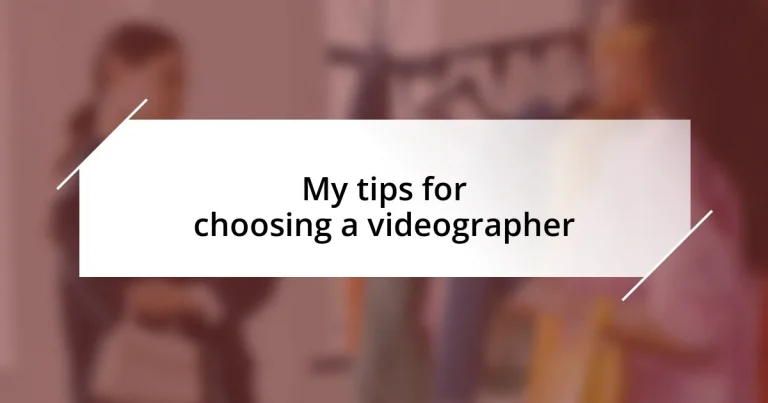Key takeaways:
- Clarify your videography needs by defining the style and length of the final video before selecting a videographer.
- Research potential candidates thoroughly, comparing portfolios to assess their storytelling ability, technical skill, and emotional impact.
- Evaluate the videographer’s experience and ask for client references to ensure they can adapt to your unique vision.
- Discuss budget and pricing openly, seeking clarity on costs and exploring negotiation options to achieve the best value.
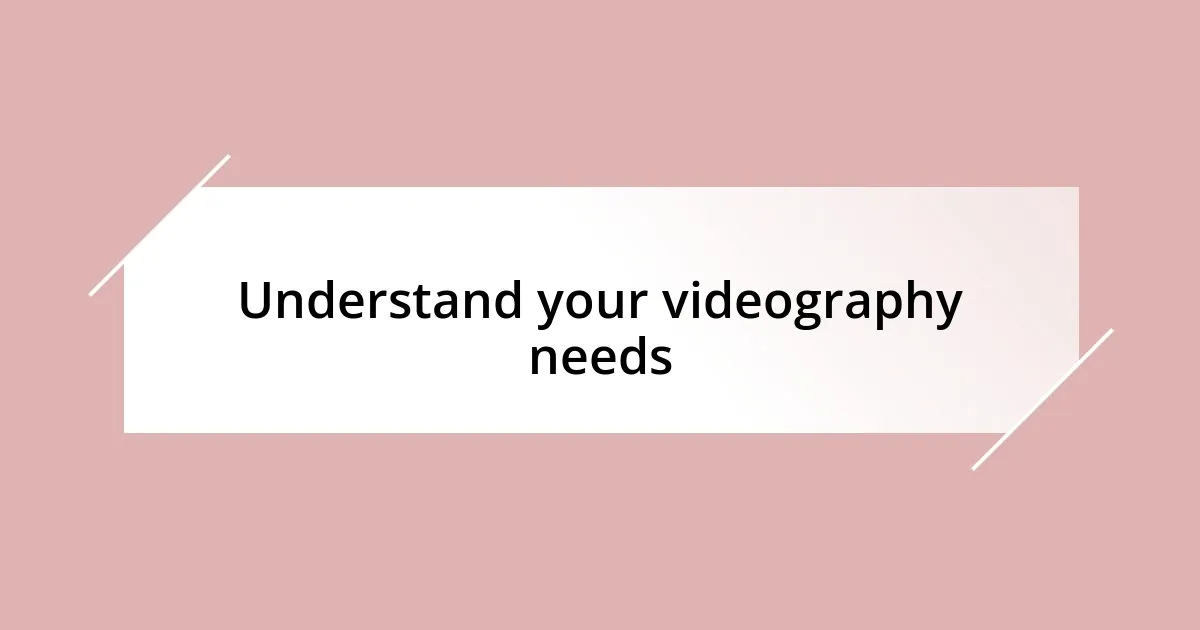
Understand your videography needs
When I started planning my own event, I realized I had to clarify what I really wanted from a videographer. Was I looking for someone to capture a candid, documentary-style video that tells a story, or did I prefer a polished, cinematic approach? It’s essential to consider the feel you want your video to convey—ask yourself, how do you want to relive those memories?
As I browsed through various portfolios, I found that some videographers specialize in specific genres, like weddings or corporate events. This realization was eye-opening! It made me think: how might their experience shape the end product? A videographer with a passionate focus on the type of event you’re planning is more likely to understand the nuances that matter most to you.
I also found it helpful to think about the length and style of the final video. Do you envision a short highlight reel, something you can share online, or a longer version that includes every moment? Reflecting on my preferences helped me articulate my needs clearly, ensuring the videographer I selected could deliver exactly what I envisioned. What about you—what memories do you want to cherish forever?

Research potential videographers
Researching potential videographers is an essential step in ensuring you find the perfect fit for your needs. I remember spending countless hours scrolling through websites, watching reels, and reading reviews. Each videographer’s unique style shone through, making me feel both excited and overwhelmed. As I compared their portfolios, I focused on how each one captured genuine moments versus more staged setups, which helped me narrow down my choices significantly.
While researching, I found it incredibly helpful to organize my findings. I began jotting down notes about each videographer’s strengths, weaknesses, and distinct styles. This process not only clarified my preferences but also highlighted key elements that resonated with me emotionally. For example, one videographer had a distinctive knack for incorporating music that suited the themes of the events they filmed, evoking powerful feelings during the viewing experience.
To streamline your search, you might consider creating a comparison table to evaluate potential candidates objectively. Here’s a simple format to guide you:
| Videographer Name | Specialization | Style | Availability | Budget |
|---|---|---|---|---|
| Example Videographer 1 | Weddings | Cinematic | Available | $2000 |
| Example Videographer 2 | Corporate | Documentary | Not Available | $1500 |
| Example Videographer 3 | Mix Events | Artistic | Available | $2500 |
This approach allows you to visualize your options and weigh the pros and cons effectively. In my experience, breaking down information into manageable parts made the decision-making process less daunting and much more enjoyable.
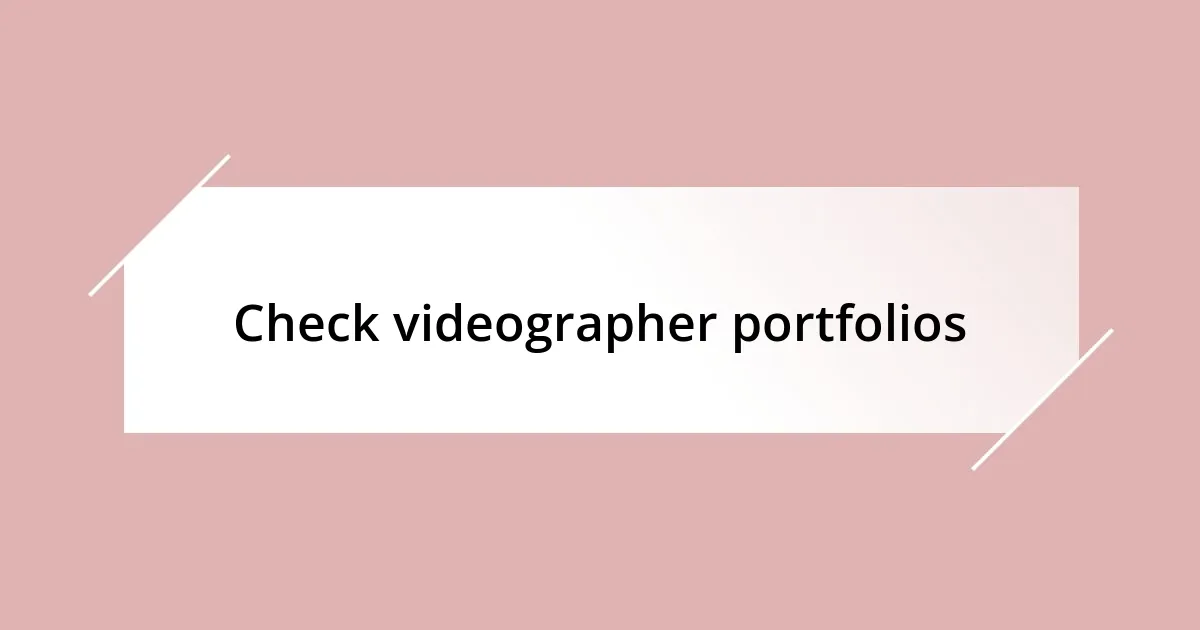
Check videographer portfolios
When I dove into reviewing videographer portfolios, I was sometimes taken aback by how different each one felt. I remember landing on one portfolio that resonated deeply with me; the emotions captured were so raw and real, it felt like I was watching moments unfold rather than just scrolling through pre-planned shots. It struck me that a strong portfolio wouldn’t just showcase technical skill but would also evoke feelings and connect with the audience on a personal level.
Here are some key elements to look for in videographer portfolios:
- Storytelling Ability: Examine how they weave narratives throughout their videos. Are you drawn into the moments?
- Technical Skill: Assess the quality of the footage, including lighting, sound, and editing. Does it look professional?
- Diversity of Work: Look for a variety of projects that demonstrate versatility. Can they adapt their style to different events?
- Emotional Impact: Pay attention to how their work makes you feel. Does it resonate with your vision?
- Client Testimonials: Check for feedback from previous clients within the portfolio. Do others feel similarly connected to their work?
As I explored these elements, I felt a growing sense of excitement—finding a videographer whose style aligned with my aesthetic made the prospect of my event feel even more special. It was as if I could already envision the final product, making my choice feel less like a task and more like an exciting journey.
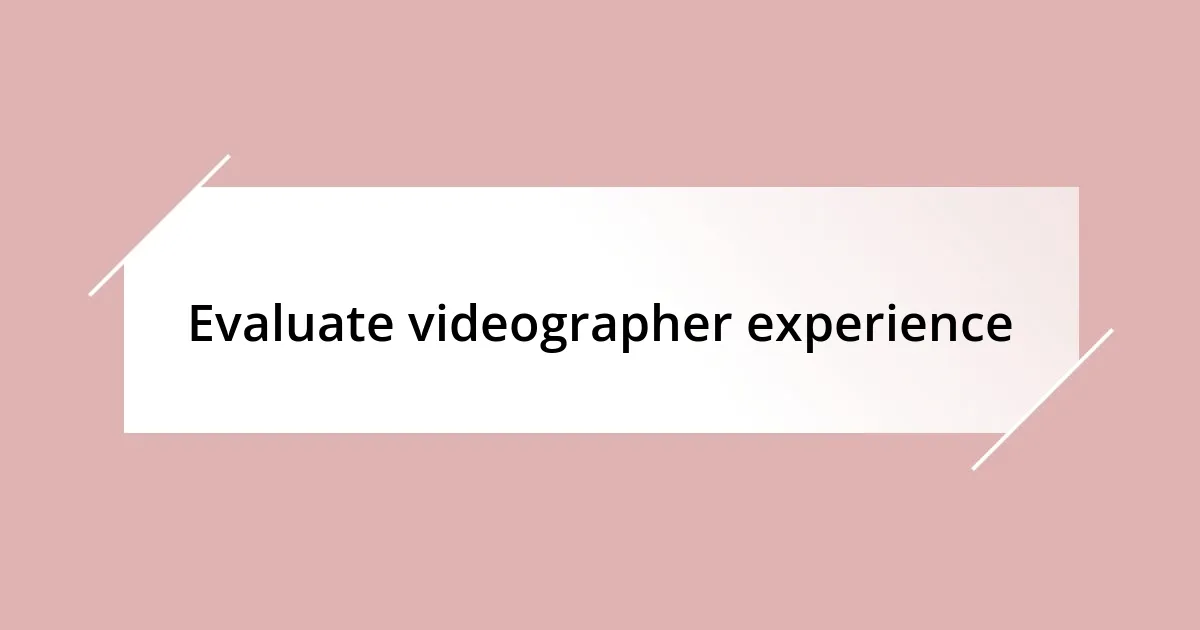
Evaluate videographer experience
When evaluating a videographer’s experience, it’s essential to consider not just years of service, but the breadth and depth of their work. I remember meeting a videographer who claimed over ten years of experience, but as I examined their recent projects, it became clear that they relied heavily on formulaic approaches. This lack of growth in style or technique made me wonder whether they could adapt to my unique vision.
Ask for detailed information about their past projects. I once requested client references from a promising candidate and was surprised by the candor of their former clients. One mentioned how the videographer’s creative direction had transformed their wedding video from a simple montage into a breathtaking story filled with meaningful moments. Conversations like these can reveal not just technical skills but also a commitment to crafting personalized narratives that resonate emotionally.
Additionally, consider any specialized training or certifications they may possess. During my search, I came across a videographer who had attended workshops focusing on emotional storytelling in film. This extra layer of expertise made me feel confident that they would understand the nuances of capturing significant moments, distinctive to my event. Seeking out such qualifications might feel overwhelming at first, but believe me, doing this homework pays off when your chosen videographer truly understands your needs.
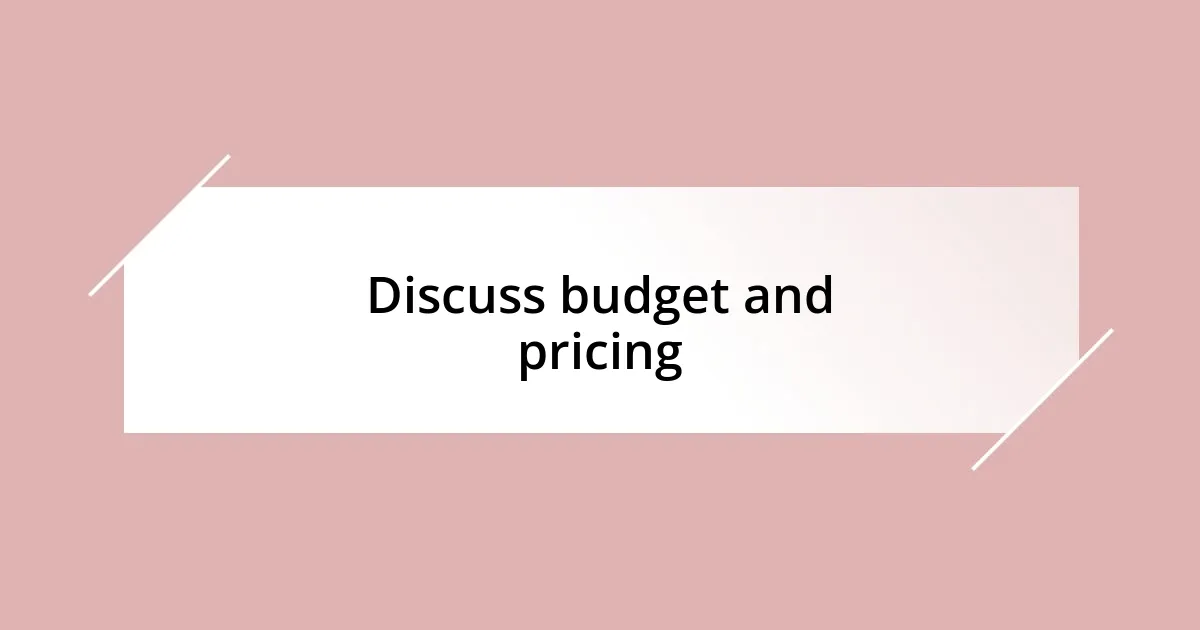
Discuss budget and pricing
When it comes to discussing budget and pricing with your prospective videographer, transparency is key. I remember the first time I sat down to talk numbers—I felt a wave of anxiety wash over me. It can be daunting, but I learned that discussing your budget upfront sets a foundation of trust. I’ve always appreciated when a videographer is open about their pricing structure, as this discussion can reveal a lot about their professionalism.
Pricing can vary widely, so it’s essential to understand what you’re paying for. In one instance, I discovered that a higher price didn’t necessarily guarantee better quality; instead, it often reflected a more thorough pre-production process. I found it helpful to break down costs into specific categories, like editing time, equipment used, and additional services offered. This approach provided clarity and helped me assess whether the investment aligned with my expectations.
Also, don’t shy away from negotiating if the quote exceeds your budget. I once shared my financial limits with a videographer, and it turned into an enriching conversation where we explored creative solutions. Sometimes, they can adjust their packages or suggest alternative options without compromising on quality. Asking questions like, “What can you do to accommodate my budget?” can lead to exciting possibilities and ensure you’re getting the best value for your money.
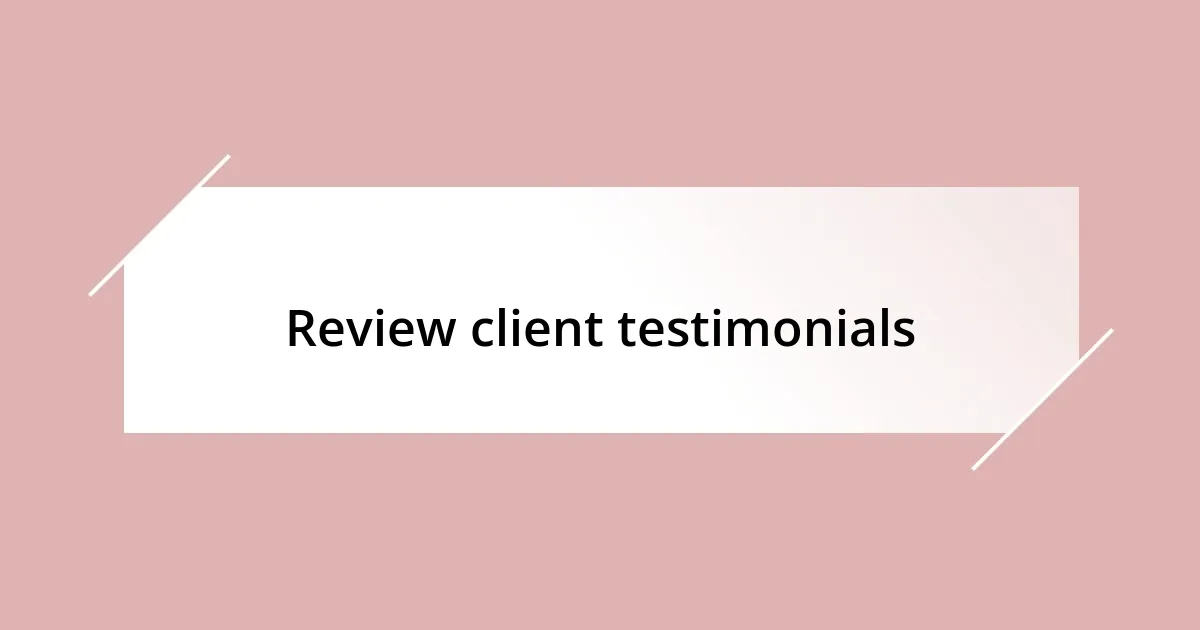
Review client testimonials
When exploring client testimonials, I always approach them with a sense of curiosity. The first time I read through a collection of testimonials, I thought they’d be straightforward, but I was surprised by the emotional depth they often contained. One couple shared how their videographer didn’t just document their wedding, but masterfully captured their love story in a way that made them both cry with joy when they first watched it. Have you ever experienced such an emotional connection with a video? It’s moments like these that show just how impactful a skilled videographer can be.
Diving deeper into testimonials can also reveal common themes or red flags. For instance, I once noticed multiple reviews highlighting a particular videographer’s knack for being unobtrusive during events. This resonated with my desire for a more documentary-style approach, which made me seriously consider working with them. Pay attention to what clients consistently praise or criticize. Are they mentioning the videographer’s communication skills or their ability to meet deadlines? Such insights can guide your decision-making process.
Finally, I encourage you to look beyond the star ratings. I always find valuable gems buried in the details of written reviews. After reading one testimonial, I learned about how a videographer went the extra mile to ensure a surprise proposal was captured from the perfect angle, turning an already special moment into something unforgettable. When you read testimonials, allow yourself to envision your own experience—can you see your milestone being captured in a similarly beautiful manner? Taking this empathetic approach transforms what might feel like a list of reviews into a foundational step toward finding the right videographer for your special occasion.
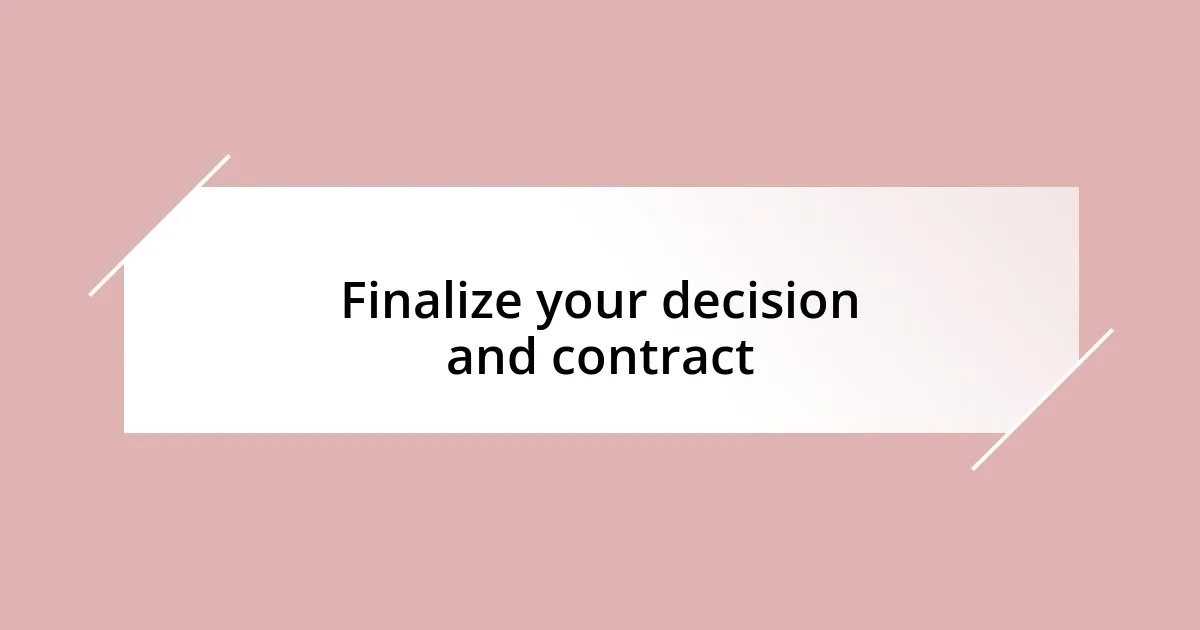
Finalize your decision and contract
After narrowing down your options, the next critical step is to finalize your decision and that contract. I still vividly remember the feeling of anticipation when I signed my first videography contract. It felt like I was sealing a promise that my vision would come to life, which was both exhilarating and nerve-wracking. Take your time to read the contract thoroughly—is everything you’ve discussed so far clearly outlined? From the timeline and deliverables to any payment schedules, ensuring everything is documented protects both parties.
Once you feel comfortable with the details, don’t hesitate to ask questions before signing. I once discovered a clause about additional fees for overtime that hadn’t been thoroughly explained during my discussions. After bringing it up, my videographer was more than happy to clarify and make adjustments. It’s those kinds of discussions that reinforce trust and demonstrate the videographer’s willingness to collaborate. Remember, this contract is about ensuring you both have a mutual understanding, so if something seems off, it’s better to address it upfront.
Finally, once the contract is signed, consider it a partnership rather than just a transaction. I’ve found that the most successful projects stem from clear communication and shared enthusiasm. Reflecting on my experiences, I realized that reaching out to my videographer with updates or ideas post-contract helped foster a collaborative atmosphere. It made the entire process feel like a joint creative journey, rather than a one-sided obligation, enhancing the final product. So, how can you establish that rapport and ensure the magic happens?












